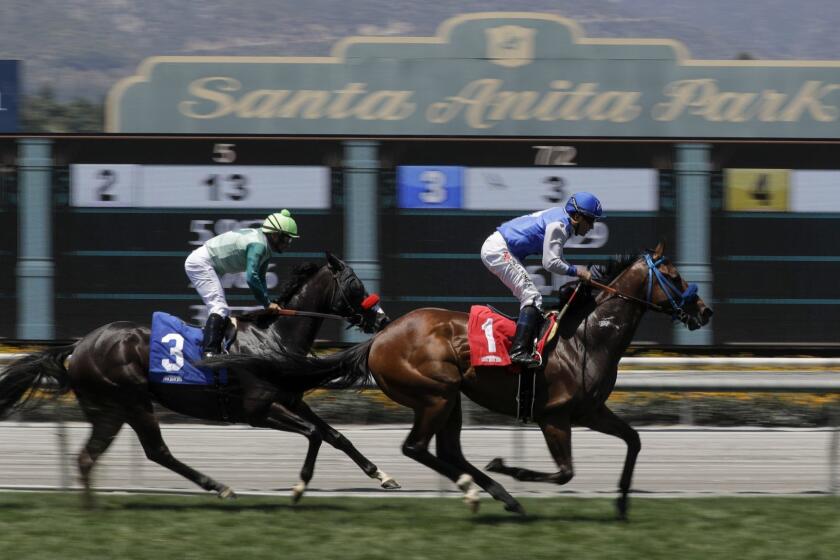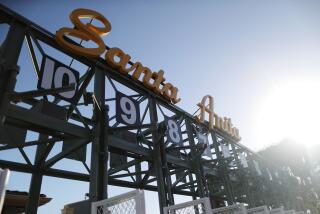After Santa Anita horse deaths, uncertainty clouds the Del Mar summer racing season
To understand how this year has been like no other in California horse racing, look at the cover of the Del Mar Owners-Trainers-Jockeys 2019 source book.
There in the bottom left corner is a picture of trainer Jerry Hollendorfer giving instructions to a jockey, something he can no longer do since he is currently not allowed to run horses at the track.
Uncertainty seems to be the theme as Del Mar opens its 80th summer racing season on Wednesday, inheriting enough baggage to fill a small airport.
The industry is still wrestling with the status of Hollendorfer, a Hall of Fame member, to determine if he can race horses at Del Mar after being slapped with a ban from Santa Anita and other tracks owned by the Stronach Group. He was banned by the ownership group after four of his horses died at Santa Anita and two at Golden Gate Fields in Northern California.
On Tuesday, Hollendorfer, along with the California Thoroughbred Trainers, filed a complaint in San Diego Superior Court for “emergency relief” because the track has denied him stalls or allowed him to enter horses. Thursday his legal team plans to ask for a restraining order against Del Mar, which, if granted, could pave the way for his return at least short term.
• The sport is enduring national scrutiny after 30 horses died during the Santa Anita meeting, puttingeveryone on alert that racing could be in jeopardy if the number of deaths don’t subside.
• There also is a greatly reduced horse population because of the problems at Santa Anita, causing many trainers to ship their horses out of state. It has already caused a reduction in the number of races, and if the situation worsens it could cut the meeting from five days a week to four.
“There seems to be a lot more on the line because of Santa Anita,” said Joe Harper, Del Mar’s longtime chief executive. “But when you think about it, that’s not bad. We need to be a little nervous. It makes us go an extra step or two.”
As tracks go, Del Mar is at the head of the class when it comes to horse and rider safety. Last year, it averaged 0.79 death per 1,000 starts, the lowest of any major track in the country. The national average is 1.68. The recently completed Santa Anita meeting was 3.17. Those numbers count only racing deaths, not training fatalities.
Sign up for our horse racing newsletter >>
It’s not as if Del Mar hasn’t found itself in a similar situation as Santa Anita. In 2016, 23 horses died either racing or training at Del Mar in a much shorter time than at Santa Anita. Its death rate that year was 3.01.
“I think it would be good if we can match last year’s numbers,” said Tom Robbins, the track’s executive vice president of racing. “But, obviously we are striving for fewer fatalities, both morning and afternoon. Our ultimate goal is to get to zero. We’re going to do our best.”
Robbins and David Jerkens, the racing secretary, have the job of managing expectations as to the quality of racing. The track plans to offer three to five fewer races a week, starting with one fewer race on Wednesday, Thursday and Sunday.
“We’re down about 15% in horses from where we were last year,” Robbins said. “But we’re working with that population and still trying to put on a product that’s worthy of the wagering public.”
There’s an expression popularized by Mark Twain that there are three kinds of lies: lies, damned lies and statistics.
The biggest hit seems to be in the area of 2-year-olds, where Del Mar would see a large number of the juveniles coming west for a robust schedule of races. The season ends with two Grade 1 races for 2-year-olds, one exclusively for fillies and one mostly for colts and geldings. Those races can be a launching pad for the Breeders’ Cup Juvenile or Juvenile Fillies races and put them on the road for the following year’s Kentucky Derby prep season.
“We know some owners and breeders have pulled back,” Robbins said. “How do we get them back? We’re not going to right now. We have what we have. But if we have a great meeting and something great happens at Santa Anita, that’s how we’ll restore confidence.”
Chuck Winner, the soon-to-be outgoing chairman of the California Horse Racing Board, is cautiously optimistic that Del Mar will have a “very good meet” based partly on the Del Mar management.
“It is never going to be good enough,” Winner said of the death rate. “You have to strive for perfection even if you can’t reach it. But after that spike in 2016, the Del Mar management has worked very hard to improve every aspect of safety. They closed the grass course and made a bunch of changes.
“Unfortunately, people respond more to crisis than preparing for it. That same thing is happening now.”
Winner saw that transformation happen at Santa Anita, but only after a change in attitude.
“We all know that part of the problem at Santa Anita was trying to increase field size,” Winner said. “But once Belinda [Stronach, TSG’s chief executive], got here, the emphasis shifted and safety became the No. 1 priority and field size had to give.”
Harper, who admits luck is as big a factor as any, likes what he hears going into Wednesday’s opener.
“I’ve been down to the track and listened to the horses galloping,” Harper said. “And you can barely hear them. It’s like the track is nice and fluffy. I like that sound.”
More to Read
Go beyond the scoreboard
Get the latest on L.A.'s teams in the daily Sports Report newsletter.
You may occasionally receive promotional content from the Los Angeles Times.












